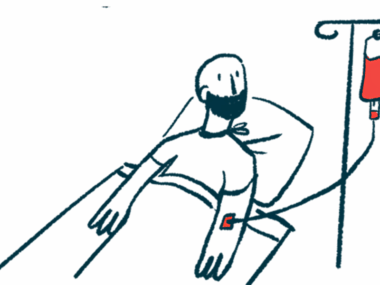MDA 2023: Ultomiris eases gMG patients’ symptoms, slows worsening
CHAMPION MG trial met main goal of significantly reducing MG-ADL scores
Written by |

Ultomiris (ravulizumab) treatment led to sustained reductions in generalized myasthenia gravis (gMG) symptom severity and acute clinical worsening events for more than a year, according to new analyses from the CHAMPION MG clinical trial and its open-label extension (OLE).
The analyses were presented at the Muscular Dystrophy Association’s MDA Clinical & Scientific Conference held March 19-22 in Dallas and virtually.
“Overall, these findings support the sustained clinical effectiveness and long-term safety of [Ultomiris],” the researchers wrote.
Ultomiris is an antibody-based therapy by Alexion, now a part of AstraZeneca, that inhibits the activation of the complement cascade, a part of the immune system thought to be implicated in gMG. It’s currently approved in the U.S., Europe, and other regions to treat adults with gMG who are positive for antibodies targeting the acetylcholine receptor (anti-AChR) — the most common type of MG-causing antibody.
Its approvals were backed by data from the Phase 3 CHAMPION MG trial (NCT03920293), which enrolled 175 adults with gMG who were positive for anti-AChR antibodies.
Participants were randomly assigned to receive Ultomiris (86 people) or a placebo (89 people), delivered directly into the bloodstream every eight weeks (after an initial loading dose) for 26 weeks, or about six months.
CHAMPION MG met its main goal of significantly improving (reducing) scores on the MG Activities of Daily Living (MG-ADL) scale — a patient-reported measure of symptom severity — relative to a placebo. Likewise, three times as many Ultomiris-treated patients had at least a 5-point reduction on the Quantitative MG (QMG) scale, a clinician-rated measure of symptom severity, compared with the placebo group.
After the main trial, 83 placebo-treated patients and 78 Ultomiris-treated patients entered the OLE, where they’re being treated with Ultomiris for up to four years.
Results of Ultomiris in OLE study
In the poster, “Long-term efficacy and safety of ravulizumab in adults with anti-acetylcholine receptor antibody-positive generalized myasthenia gravis,” the researchers discussed efficacy findings from the OLE. The analysis involved data from 161 patients gathered up to 60 weeks after the start of the main trial, or 34 weeks after the OLE started.
Consistent with an interim analysis, data showed gains made during the main trial for those originally assigned to Ultomiris were generally sustained through 60 weeks of treatment, with a mean drop of 4.0 points in MG-ADL scores and 4.1 points in QMG.
Moreover, those who switched to Ultomiris in the OLE exhibited significant, rapid improvements in both MG-ADL and QMG that were sustained through treatment. From the start of the OLE to 34 weeks later, these patients saw a 1.7-point improvement in MG-ADL scores and a 3.1-point improvement in QMG. Measures of quality of life were also improved.
New exploratory analyses also suggest Ultomiris was associated with fewer acute clinical deterioration events over the same 60 weeks.
Frequency of deterioration events with Ultomiris
Those findings were discussed in an oral presentation titled, “Ravulizumab reduces clinical deteriorations in patients with generalized myasthenia gravis: Results from the CHAMPION MG study,” by Tuan Vu, MD, of the University of South Florida Morsani College of Medicine, and one of the study’s investigators.
Clinical deterioration events were defined as myasthenic crises — episodes of muscle weakness severe enough to require a breathing tube — significant symptom worsening, as assessed by the MG-ADL, or a need for rescue therapy.
During the main placebo-controlled part of CHAMPION MG, fewer deterioration events were observed with Ultomiris than a placebo. Specifically, 10 deterioration events occurred in eight Ultomiris-treated patients (9.3%), compared with 26 events in 15 placebo-treated patients (16.9%) — a nearly 50% lower proportion of patients having such events, according to Vu.
The frequency of deterioration events was significantly reduced to 4.8% once patients switched from placebo to Ultomiris in the OLE and remained stable in those who’d continuously been on Ultomiris.
In the year before the trial, the clinical deterioration event rate was 44.4 events per 100 patient years across all the participants. This increased to more than 60 events per 100 patient years in the placebo group during the main trial, a 38.8% increase. Vu said this increase could be due to the cessation of certain other therapies in the month before the trial started. Patient years is a composite measure that takes into account the number of patients and the amount of time they were followed. For instance, 100 patient years refers to 100 patients being followed for one year.
In contrast, Ultomiris-treated patients saw a nearly 60% decrease in deterioration event rates compared with pre-study levels and a 71.1% decrease from a placebo.
“Given the impact and burden of clinical deterioration events on people with gMG, these results demonstrate an important benefit for patients treated with [Ultomiris],” Vu said.
Across the trial and OLE, Ultomiris was generally well tolerated, with headache and diarrhea being the most common side effects. Six serious side effects were considered related to treatment. None of four reported deaths were attributed to Ultomiris.



Leave a comment
Fill in the required fields to post. Your email address will not be published.